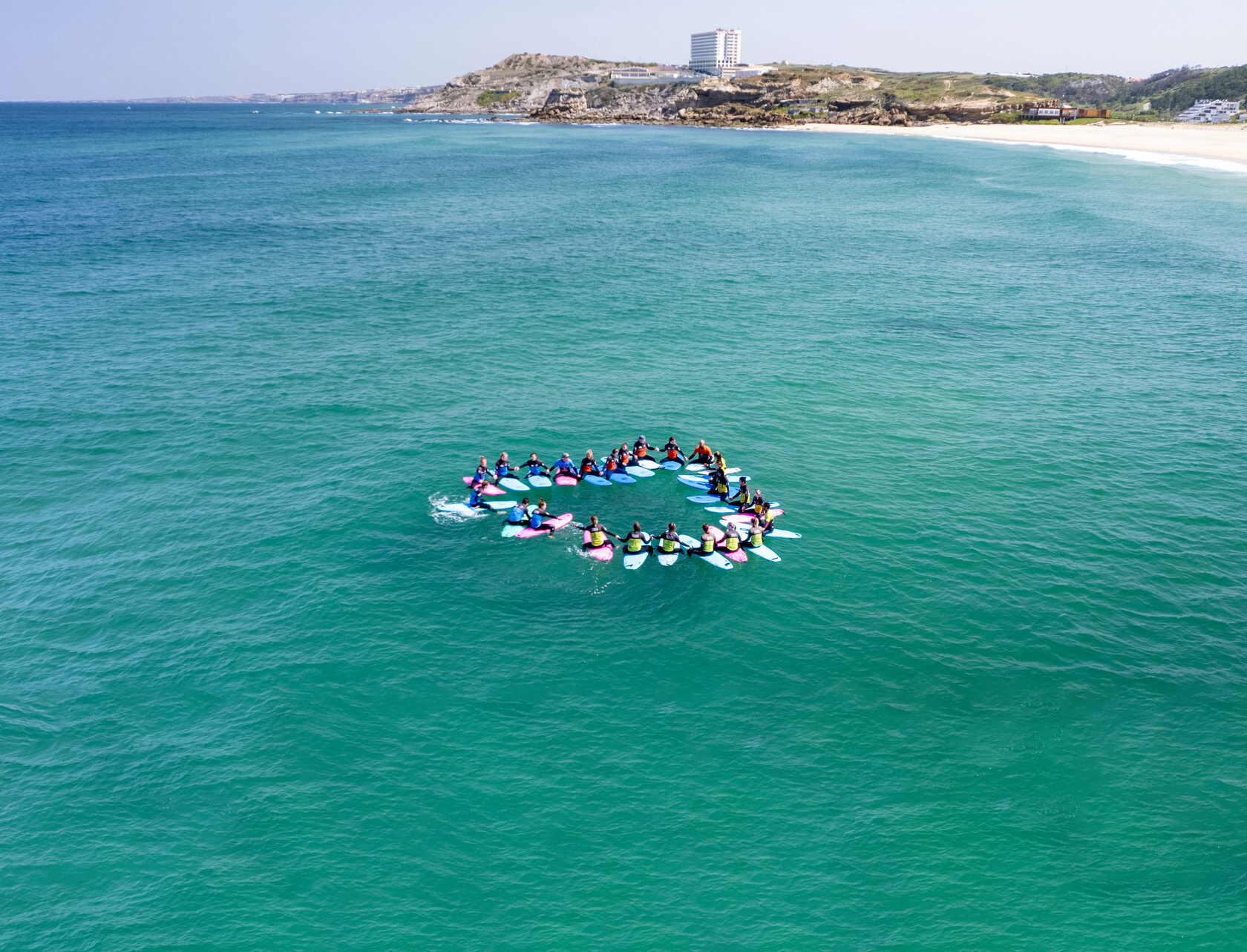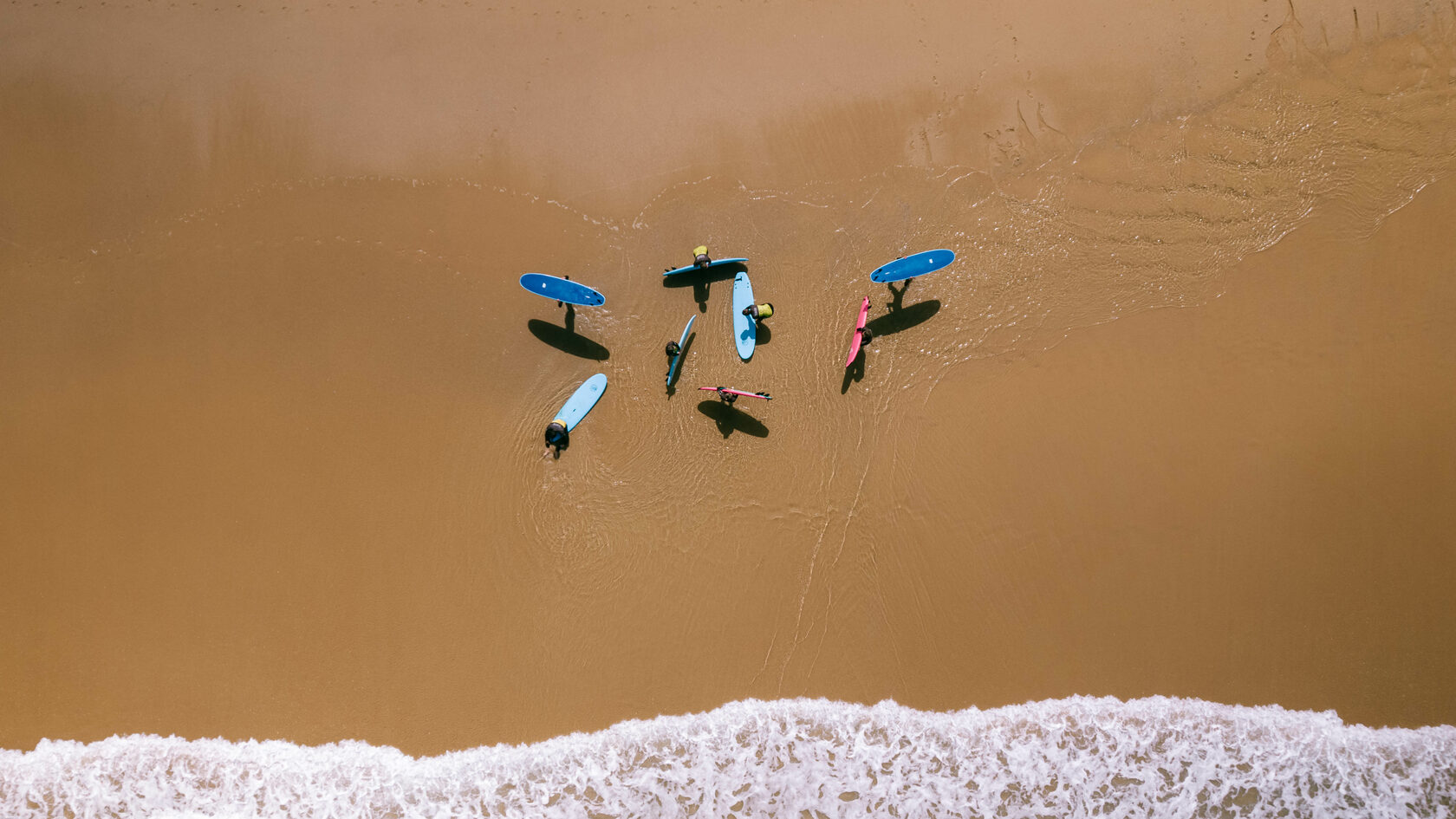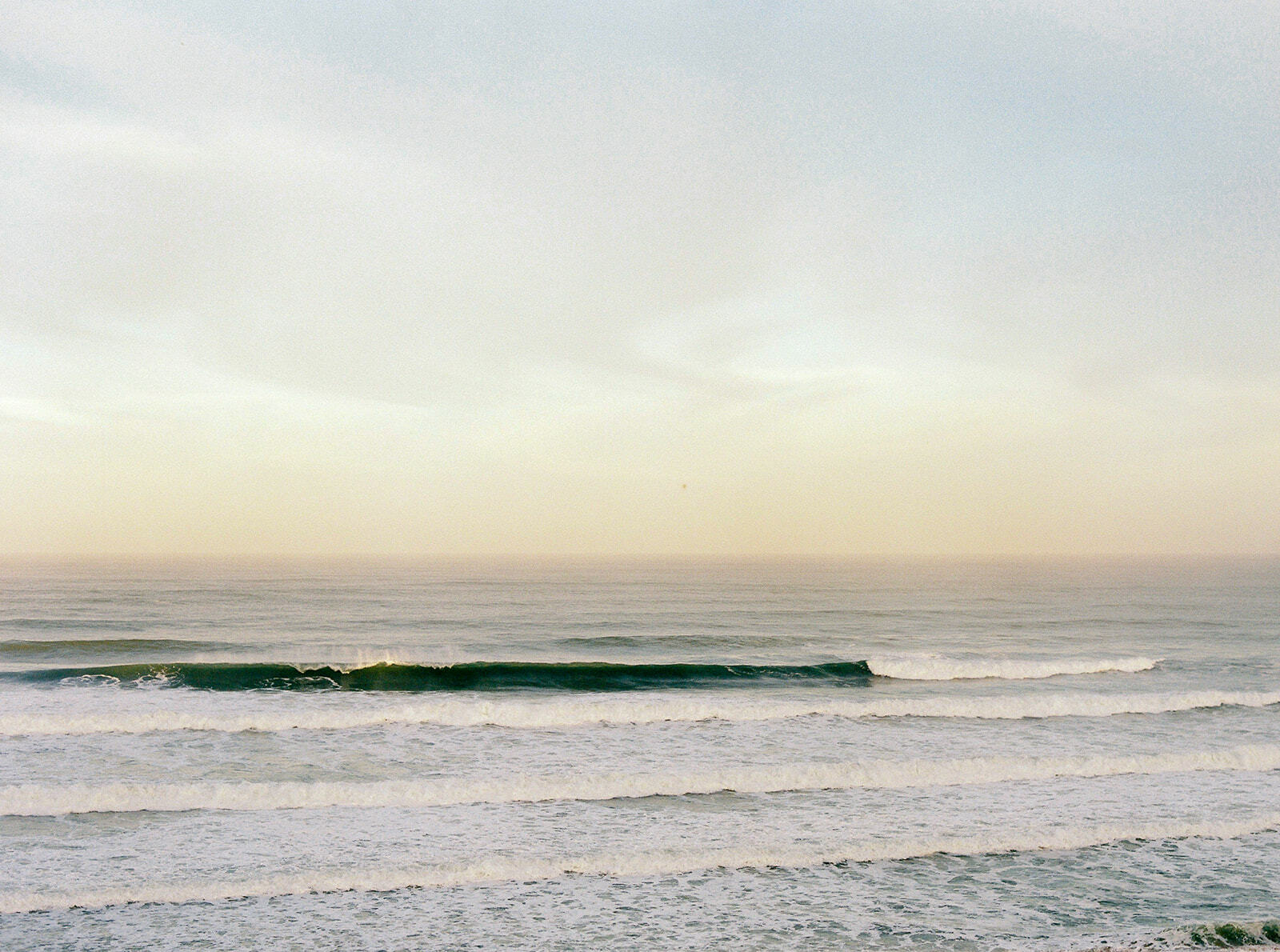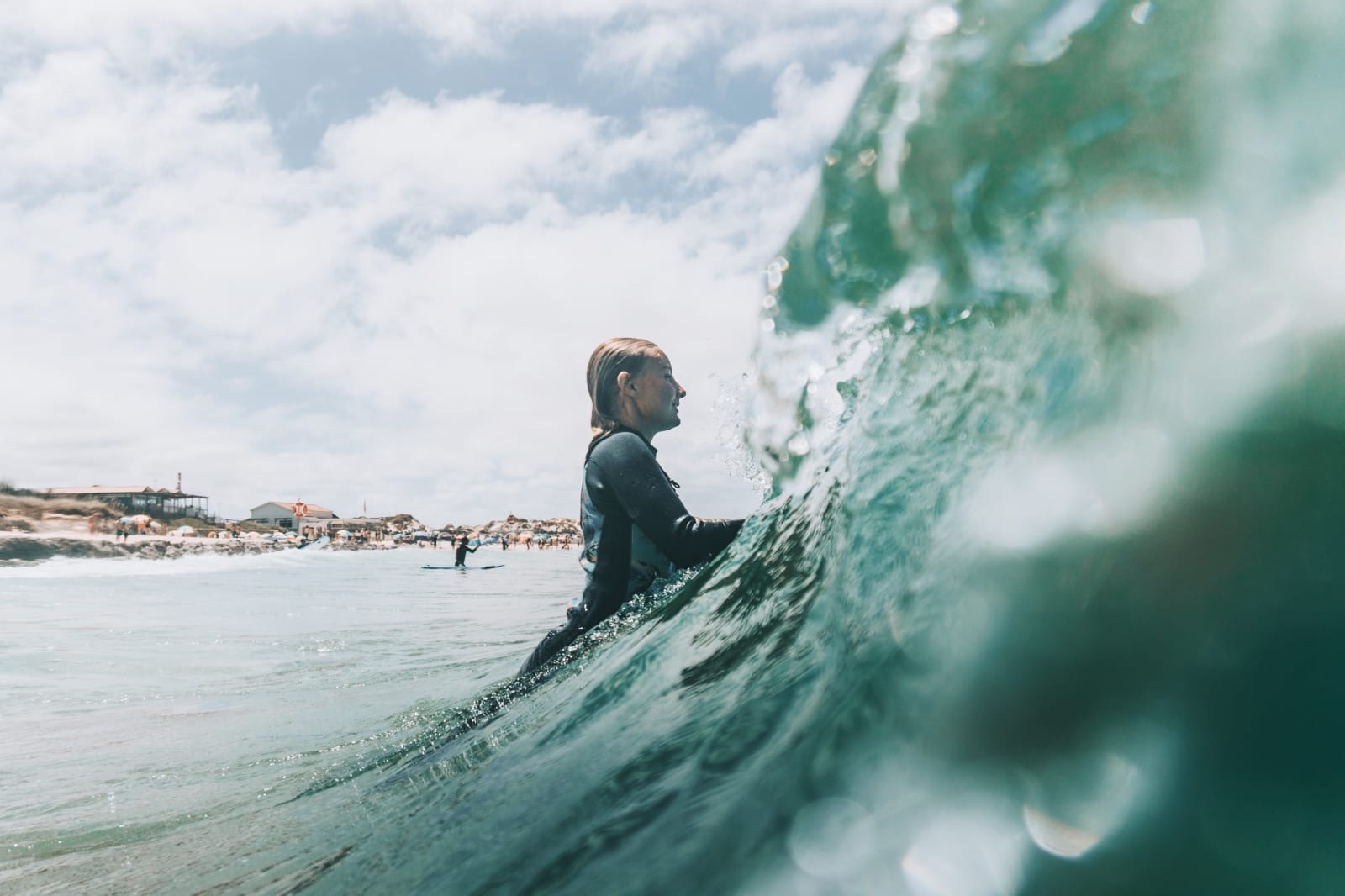21 Surfing Tips and Tricks for Beginners:
Learn How to Surf with Our Guide!
The ocean is powerful and learning how to navigate it, catch waves and avoid accidents is crucial. In addition to ocean knowledge, there are unwritten rules when interacting with surfers in the water that are important to remember for both beginner surfer and experienced surfers. Finally, surfing is a communal activity, and learning with a surf camp is more enjoyable than struggling alone.
We have put together 21 tips for beginner surfers that will help you start your awesome new journey.
We have put together 21 tips for beginner surfers that will help you start your awesome new journey.
Table of contents
- Start with the right surf gear
- Always surf with a buddy or in a group
- Pick a beach with smaller waves and a gentle beginner spot
- Practice popping up on land before heading into the water
- Learn to read the ocean - observe currents and rips
- Never turn your back on the ocean
- Surfing etiquette: be aware of other beginner surfers around you
- As a beginner surfer, don't try to catch every wave - choose the right wave for your surfing skill level
- Stay calm and relaxed - surfing is all about balance and flow
- Keep your weight forward and centered on the board
- Use your arms for balance and to steer
- Look where you want to go, not down at your feet
- Don't bail out too early - ride the wave as far as you can
- Learn to fall safely - always cover your head and fall flat if possible
- Stay hydrated and take breaks when needed
- Best beginner surfing tips - respect the locals and the environment
- Avoid surfing near piers, rocks or other hazards
- Listen to the lifeguards
- Learn the different types of breaks and waves
- Keep practicing and don't give up! Surfing takes time and dedication
- Have fun and enjoy the ride - surfing is an amazing experience and a great way to connect with nature!

1. Start with the right surf gear
Choosing the right gear can greatly affect the success of a beginner surfer. In particular, it is recommended to choose a big board such as beginner foam surfboard. Big boards provide more stability and buoyancy which is helpful when trying to catch small waves in the whitewater. It is also important to consider other equipment such as a surf leash, wetsuit, and rash guard depending on the water temperature and weather conditions.
Joining one of our Surf Yoga Skate trips is a great way to get tips on the proper equipment for beginner surfer. Our certified instructors will explain and show you the difference between soft and hard surfboard, as well as will give you an advice on other equipment such as beginner surfboard, surf leash, wetsuit etc..
Joining one of our Surf Yoga Skate trips is a great way to get tips on the proper equipment for beginner surfer. Our certified instructors will explain and show you the difference between soft and hard surfboard, as well as will give you an advice on other equipment such as beginner surfboard, surf leash, wetsuit etc..

2. Always surf with a buddy or in a group
The surfing for beginners tip of always surfing with a buddy or in a group is a critical safety measure that all surfers should follow, especially beginners. Surfing can be a dangerous sport, and having someone to watch your back can make all the difference in case of an emergency.
When learning to surf, it's essential to take surf lessons from a qualified instructor and learn about local surf breaks from your local surf shop. Before hitting the water, it's important to stretch and warm up to prevent injuries.
When you're ready to paddle out, make sure to do it with a buddy or in a group. It's also crucial to stay within the designated line up area, where surfers wait for waves, to avoid collisions with surfers. Keep an eye out for any potential hazards, such as rocks, rip currents, or other beginner surfers, and always follow proper surfer etiquette.
By surfing with a friend, you can help each other out in case of an emergency, such as getting caught in a rip current or suffering an injury. In addition to being safer, surfing with others can also be more enjoyable and allow you to share the experience with others.
When learning to surf, it's essential to take surf lessons from a qualified instructor and learn about local surf breaks from your local surf shop. Before hitting the water, it's important to stretch and warm up to prevent injuries.
When you're ready to paddle out, make sure to do it with a buddy or in a group. It's also crucial to stay within the designated line up area, where surfers wait for waves, to avoid collisions with surfers. Keep an eye out for any potential hazards, such as rocks, rip currents, or other beginner surfers, and always follow proper surfer etiquette.
By surfing with a friend, you can help each other out in case of an emergency, such as getting caught in a rip current or suffering an injury. In addition to being safer, surfing with others can also be more enjoyable and allow you to share the experience with others.

3. Pick a beach with smaller waves and a gentle beginner spot
It is recommended that beginners choose a beach with smaller waves and a gentle beginner surf spot. This will allow them to learn how to stand up on their board and get comfortable with the basics of surfing without putting themselves in danger.
Do some research before heading to the beach to ensure that the conditions are suitable for beginners. Check online for local surf reports, as well as any current weather or tide warnings. It's also a good idea to talk to locals or lifeguards about the best beginner spots in the area.
By choosing a beach with smaller waves and a gentle surf spot, beginners can build their confidence and skills without feeling overwhelmed. As they progress, they can gradually move on to more challenging surf spots. Remember, safety always comes first, so never underestimate the power of the ocean and always be aware of your own skill level.
Do some research before heading to the beach to ensure that the conditions are suitable for beginners. Check online for local surf reports, as well as any current weather or tide warnings. It's also a good idea to talk to locals or lifeguards about the best beginner spots in the area.
By choosing a beach with smaller waves and a gentle surf spot, beginners can build their confidence and skills without feeling overwhelmed. As they progress, they can gradually move on to more challenging surf spots. Remember, safety always comes first, so never underestimate the power of the ocean and always be aware of your own skill level.

4. Practice popping up on land before heading into the water
Having a good teacher can also make a huge difference in learning the proper technique for getting up on the board. A qualified instructor can provide guidance on posture, the placement of your hands and feet, and help you develop good habits, such as warm up.
Another key factor in getting up on the board is flexibility. Before hitting the water, take some time to stretch your muscles, especially your legs, hips, and back. These tips will help you move more smoothly and avoid any muscle strains or injuries.
It's also important to pay attention to which foot you naturally lead with when getting up on the board. Most people tend to lead with their left foot, but some may find it easier to use their right foot. Paying attention to your natural stance can help you develop better balance and stability on the board.
Practicing getting up on your board on land, having a good teacher, stretching, warm up, and paying attention to your natural foot stance can all contribute to a more successful and enjoyable surfing experience. By avoiding bad habits and focusing on proper technique, you can improve your skills and become a better surfer.
Another key factor in getting up on the board is flexibility. Before hitting the water, take some time to stretch your muscles, especially your legs, hips, and back. These tips will help you move more smoothly and avoid any muscle strains or injuries.
It's also important to pay attention to which foot you naturally lead with when getting up on the board. Most people tend to lead with their left foot, but some may find it easier to use their right foot. Paying attention to your natural stance can help you develop better balance and stability on the board.
Practicing getting up on your board on land, having a good teacher, stretching, warm up, and paying attention to your natural foot stance can all contribute to a more successful and enjoyable surfing experience. By avoiding bad habits and focusing on proper technique, you can improve your skills and become a better surfer.

5. Learn to read the ocean - observe currents and rips
As an inexperienced surfer, one of the best things you can do to improve your surfing is to learn how to read the ocean. This means understanding the different types of waves, currents, and conditions that you'll encounter in the water.
Start by choosing the right spot with whitewater before you paddle out . Check the tides on the special apps like Surfline or MagicSeeWeed. They will tell you about the tides: if this spot works better at high tide or low tide. Look for a spot with smaller waves and a gentle, rolling break. This will help you gain confidence and build your skills before moving on to bigger sets.
Once you're in the water, stop paddling and observe the ocean. Look for the sets are coming in, and try to position yourself in the right spot to catch the next wave. This takes practice, so be patient and keep trying.
Start by choosing the right spot with whitewater before you paddle out . Check the tides on the special apps like Surfline or MagicSeeWeed. They will tell you about the tides: if this spot works better at high tide or low tide. Look for a spot with smaller waves and a gentle, rolling break. This will help you gain confidence and build your skills before moving on to bigger sets.
Once you're in the water, stop paddling and observe the ocean. Look for the sets are coming in, and try to position yourself in the right spot to catch the next wave. This takes practice, so be patient and keep trying.
Always be aware of others in the water.
Never drop in on someone else's wave or get in their way.
By following these tips, you'll be well on your way to becoming a confident and competent surfer. Remember to stay safe, have fun, and never stop learning!
By following these tips, you'll be well on your way to becoming a confident and competent surfer. Remember to stay safe, have fun, and never stop learning!

6. Never turn your back on the ocean
This is a fundamental rule in surfing that is often repeated by experienced surfers. When you are in the water, keep an eye on the waves and the movements of the ocean at all times. Turning your back on the ocean leaves you vulnerable to unexpected waves and dangerous currents, which can lead to accidents and injuries.
As a beginner, never turn your back on the ocean, even when you're on the beach or at beginner friendly surf spot. Before entering the water, take a few minutes to observe the waves and the currents. Look for any signs of danger, such as large shorebreak waves, strong riptides or sudden drop-offs. Always enter the water slowly, with caution, and never dive into a wave headfirst if you're not 100% sure of the depth.
Keep your head up and be aware of your surroundings at all times. Avoid getting too close to rocks or shallow areas, and never try to ride waves that is beyond your skill level.
By following beginner surfing tips, you can increase your safety and reduce the risk of accidents while surfing. Always keep a healthy respect for the power of the ocean and be aware of its movements, and you'll be able to enjoy the waves with confidence and peace of mind.
As a beginner, never turn your back on the ocean, even when you're on the beach or at beginner friendly surf spot. Before entering the water, take a few minutes to observe the waves and the currents. Look for any signs of danger, such as large shorebreak waves, strong riptides or sudden drop-offs. Always enter the water slowly, with caution, and never dive into a wave headfirst if you're not 100% sure of the depth.
Keep your head up and be aware of your surroundings at all times. Avoid getting too close to rocks or shallow areas, and never try to ride waves that is beyond your skill level.
By following beginner surfing tips, you can increase your safety and reduce the risk of accidents while surfing. Always keep a healthy respect for the power of the ocean and be aware of its movements, and you'll be able to enjoy the waves with confidence and peace of mind.

7. Surfing etiquette: be aware of other beginner surfers around you
Being aware of other surfers around you is a crucial aspect of surfing that can help you avoid dangerous collisions in the water.
One way to do this is to constantly scan the water around you, checking for beginner surfers, swimmers, or obstacles. Try to keep a safe distance from advanced surfers and give them plenty of room to maneuver, especially if they are more experienced than you.
It's important to understand the unwritten rules of surfing etiquette. For example, the surfer who is closest to the peak of the wave has the right of way, and other surfers should yield to them. If you are paddling out to the lineup, you should stay out of the way of surfers who are riding waves.
By being aware of beginner surfers during your surf lesson and following the proper surf etiquette, you can help create a safer and more enjoyable experience for everyone in the water.
One way to do this is to constantly scan the water around you, checking for beginner surfers, swimmers, or obstacles. Try to keep a safe distance from advanced surfers and give them plenty of room to maneuver, especially if they are more experienced than you.
It's important to understand the unwritten rules of surfing etiquette. For example, the surfer who is closest to the peak of the wave has the right of way, and other surfers should yield to them. If you are paddling out to the lineup, you should stay out of the way of surfers who are riding waves.
By being aware of beginner surfers during your surf lesson and following the proper surf etiquette, you can help create a safer and more enjoyable experience for everyone in the water.

8. As a beginner surfer, don't try to catch every wave - choose the right wave for your surfing skill level
When starting out in surfing, it's common for beginners to feel the need to catch every wave that comes their way. However, not every wave is meant to be caught, and trying to catch every wave can actually hinder your progress.
One reason for this is that trying to catch every wave can leave you feeling fatigued and frustrated, as you may be expending a lot of energy paddling for waves that are not surfable or are beyond your skill level.
Instead, be selective about the waves you choose to catch. Look for waves that are in your skill level, not too big or too small, and that has a good shape for riding. You'll be able to conserve your energy and focus on catching best waves.
Being too eager to catch every wave can lead to unsafe situations in the water.
Our beginner surfing tip is : don't be discouraged if you don't catch every wave - it's all part of the learning process. Instead, focus on being selective and catching waves that will help you progress as a surfer.
One reason for this is that trying to catch every wave can leave you feeling fatigued and frustrated, as you may be expending a lot of energy paddling for waves that are not surfable or are beyond your skill level.
Instead, be selective about the waves you choose to catch. Look for waves that are in your skill level, not too big or too small, and that has a good shape for riding. You'll be able to conserve your energy and focus on catching best waves.
Being too eager to catch every wave can lead to unsafe situations in the water.
Our beginner surfing tip is : don't be discouraged if you don't catch every wave - it's all part of the learning process. Instead, focus on being selective and catching waves that will help you progress as a surfer.

9. Stay calm and relaxed - surfing is all about balance and flow
Surfing can be an exhilarating and adrenaline-fueled sport, but it's important to remember to stay calm and relaxed while in the water. Being nervous or tense can actually hinder your performance and make it harder to catch waves. It's important to breathe deeply, relax your muscles, and stay focused on the present moment.
Staying calm also helps you conserve your energy and avoid getting fatigued too quickly.
This is especially important for beginners who may not have the stamina to spend hours in the water. By staying relaxed and composed, you can make the most of your time in the water and increase your chances of catching some great waves.
So whether you're a seasoned surfer or a beginner surfer just starting out, remember to stay calm and relaxed in the water. It can make all the difference in your surfing experience.
So whether you're a seasoned surfer or a beginner surfer just starting out, remember to stay calm and relaxed in the water. It can make all the difference in your surfing experience.
10. Keep your weight forward and centered on the board
When you are learning to surf, maintaining the right position on your board is important to be able to paddle efficiently and catch more waves. During surf lessons, instructors often emphasize practicing the "pop up" technique and being able to stand up on your board quickly, which requires a proper weight distribution.
Once you have mastered the surf basics, keeping your weight forward and centered on the board becomes even more important for advanced surfing. This technique will help you generate more speed and momentum as you ride the wave, allowing you to perform maneuvers and tricks.
In order to keep your weight forward and centered, it's important to have good paddling and to practice sitting on your board in the right position. Additionally, tips such as maintaining a low center of gravity and keeping your knees slightly bent can help you maintain balance and control on your board, especially when riding a breaking wave.
Once you have mastered the surf basics, keeping your weight forward and centered on the board becomes even more important for advanced surfing. This technique will help you generate more speed and momentum as you ride the wave, allowing you to perform maneuvers and tricks.
In order to keep your weight forward and centered, it's important to have good paddling and to practice sitting on your board in the right position. Additionally, tips such as maintaining a low center of gravity and keeping your knees slightly bent can help you maintain balance and control on your board, especially when riding a breaking wave.

11. Use your arms for balance and to steer
As a beginner, it's important to learn how to use your arms to help you balance and steer on the board. Here are some beginner surfing tips to keep in mind:
1. When you're first starting out, it can be challenging to maintain your balance on the board.
To help, use your arms to shift your weight and stay centered. As you ride a wave, keep your arms out to the side and slightly bent at the elbow. This will help you maintain your balance and prevent you from falling off the board.
2. Your arms can also be used to steer the board.
To turn left, reach your left arm out in front of you and use it to guide the board in that direction. To turn right, do the same thing with your right arm. By using your arms to steer, you'll have more control over the board and be able to navigate the waves more effectively.
3. Practice makes perfect.
Like anything, the more you practice, the better you'll become. So don't be discouraged if you're struggling at first. Keep practicing and soon you'll be able to use your arms to balance and steer without even thinking about it.
Remember, surfing takes time and practice to master, but with patience and dedication, you'll be riding the wave like an experienced surfer in no time.

12. Look where you want to go, not down at your feet
Another important tip for beginner surfers is to focus on looking ahead, instead of staring down at your feet. Here's why this is important:
1. Looking ahead helps with staying on the wave:
When you're surfing, your body naturally follows where you're looking. If you're constantly looking down at your feet, you're more likely to fall off the board and lose the wave. By looking ahead, you'll be able to maintain your speed and stay on the wave for longer periods of time.
2. Looking ahead helps with navigating the waves:
As a beginner, it's important to focus on navigating the waves and avoiding obstacles. By looking ahead, you'll be able to spot potential obstacles such as rocks or shallow areas, and steer your board around them. This will help you stay safe and avoid accidents.
3. Looking ahead helps with improving technique:
By focusing on where you want to go, you'll be able to better execute your turns and other techniques. This is because your body will naturally follow the direction you're looking, making it easier to control the board and ride the waves with style.
Remember, surfing is a sport that requires good visual awareness, and looking where you want to go is a key part of mastering the basics. So keep your eyes up and focused on the horizon, and you'll be well on your way to becoming a skilled surfer.

13. Don't bail out too early - ride the wave as far as you can
As a beginner surfer, it can be tempting to bail out of a wave as soon as you feel like you're losing control. The surf tip "Don't bail out too early - ride the wave as far as you can" emphasizes the importance of staying on the wave until it naturally ends. This is especially important for beginners, who may be tempted to bail out of a wave as soon as they feel like they're losing control. By sticking with the wave, you'll have the opportunity to fully experience the rush of riding it to its end and learn more about your technique.
To ride a wave as far as you can, you need to have total control on your surfboard. Keep your knees bent to maintain stability on the board, especially when tackling big waves. Use time paddling to catch the wave and maintain your speed, and use the duck dive technique to go under wave that are too big to ride. Make sure to spend time lining up and positioning yourself in the right spot before catching the wave, especially if it's your first time surfing in a particular spot.
By riding a wave as far as you can, you'll improve your stamina and endurance, which are important skills for any surfer. You'll also gain a better understanding of how the wave moves and how your board responds, which can help you make adjustments for your next ride. So resist the urge to bail out too early, and enjoy the thrill of riding the wave all the way to the end.
To ride a wave as far as you can, you need to have total control on your surfboard. Keep your knees bent to maintain stability on the board, especially when tackling big waves. Use time paddling to catch the wave and maintain your speed, and use the duck dive technique to go under wave that are too big to ride. Make sure to spend time lining up and positioning yourself in the right spot before catching the wave, especially if it's your first time surfing in a particular spot.
By riding a wave as far as you can, you'll improve your stamina and endurance, which are important skills for any surfer. You'll also gain a better understanding of how the wave moves and how your board responds, which can help you make adjustments for your next ride. So resist the urge to bail out too early, and enjoy the thrill of riding the wave all the way to the end.

14. Learn to fall safely - always cover your head and fall flat if possible
Falling is a natural part of surfing, and it's important to know how to do it safely to avoid injury.
To start, it's important to be in a good position on your board before attempting to catch a wave. Keep your knees bent and your weight centered to maintain control. When paddling, use paddle power to help you gain speed and reach the wave's peak.
Once you catch the wave, avoid nosediving by leaning back slightly and keeping your weight centered. Try to spend time riding the open face of the wave rather than the whitewater, as this will give you more speed and a smoother ride.
As you surf, be mindful of surfer etiquette and wave count. Avoid "dropping in" on most surfers by waiting your turn and giving surfers enough space. Keep track of your wave count to avoid hogging wave and allowing others a fair share.
If you do fall, always cover your head with your arms and fall flat if possible. This can help prevent serious injuries from hitting the board or the ocean floor. With practice and experience, you'll learn to fall safely and quickly get back on your board to catch the next wave.
To start, it's important to be in a good position on your board before attempting to catch a wave. Keep your knees bent and your weight centered to maintain control. When paddling, use paddle power to help you gain speed and reach the wave's peak.
Once you catch the wave, avoid nosediving by leaning back slightly and keeping your weight centered. Try to spend time riding the open face of the wave rather than the whitewater, as this will give you more speed and a smoother ride.
As you surf, be mindful of surfer etiquette and wave count. Avoid "dropping in" on most surfers by waiting your turn and giving surfers enough space. Keep track of your wave count to avoid hogging wave and allowing others a fair share.
If you do fall, always cover your head with your arms and fall flat if possible. This can help prevent serious injuries from hitting the board or the ocean floor. With practice and experience, you'll learn to fall safely and quickly get back on your board to catch the next wave.

15. Stay hydrated and take breaks when needed
The surf tip of staying hydrated and taking breaks when needed is important for beginners in surfing. When taking a surf lesson or visiting different beach, it's easy to get caught up in the excitement and forget to take care of your body. However, surfing can be physically demanding, and it's important to stay hydrated to avoid dehydration and exhaustion.
Drinking water or a sports drink before, during, and after your surf session can help you maintain your energy levels and prevent dehydration. It's also important to take breaks and rest when you feel tired, especially during long surf sessions or in hot weather.
In addition to staying hydrated, it's also important to protect your skin from the sun's rays. Many surfers spend hours in the water, exposed to the sun, which can lead to sunburn and other skin damage. To prevent sunburn, it's important to apply sunscreen before entering the water and reapply it every few hours.
Drinking water or a sports drink before, during, and after your surf session can help you maintain your energy levels and prevent dehydration. It's also important to take breaks and rest when you feel tired, especially during long surf sessions or in hot weather.
In addition to staying hydrated, it's also important to protect your skin from the sun's rays. Many surfers spend hours in the water, exposed to the sun, which can lead to sunburn and other skin damage. To prevent sunburn, it's important to apply sunscreen before entering the water and reapply it every few hours.

16. Best beginner surfing tips - respect the locals and the environment
When surfing in a new area, it's important to respect the surfers who have been surfing there for years. Observe the lineup and how they are surfing, and try to follow their lead. Don't drop in on their waves or hog the best spot in the lineup. Show respect, and you'll earn respect in return.
Respect the environment
The ocean is a delicate ecosystem, and it's important to do your part in protecting it. Don't litter, and if you see any trash on the beach, pick it up and dispose of it properly. Avoid touching or damaging any marine life or their habitats.
Follow the rules: Different surf spots have different rules, such as the order in which surfers take waves or how close you can get to more advanced surfers. Make sure to follow these rules to avoid accidents or conflicts on the same wave.
Follow the rules: Different surf spots have different rules, such as the order in which surfers take waves or how close you can get to more advanced surfers. Make sure to follow these rules to avoid accidents or conflicts on the same wave.

17. Avoid surfing near piers, rocks or other hazards
Be aware of your surroundings and avoid potential hazards in the water: piers, rocks, and other obstructions can be dangerous and cause injury to surfers.
Surfing near piers can be particularly hazardous as the waves can reflect off the pier and create unpredictable conditions. The pylons and other structures can also pose a danger if you fall off your board.
Similarly, rocks can cause injury if you get too close and wipe out. It's important to be aware of where the rocks are and avoid surfing too close to them.
Other hazards to be aware of include underwater obstructions such as shipwrecks, reefs, and sandbars. These can be dangerous if you're not familiar with the area or don't know how to navigate around them.
To ensure your safety while surfing, always check the conditions before entering the water and be aware of any potential hazards. It's better to err on the side of caution and avoid surfing in areas where there are known hazards. By doing so, you can enjoy a safer and more enjoyable surfing experience.
Surfing near piers can be particularly hazardous as the waves can reflect off the pier and create unpredictable conditions. The pylons and other structures can also pose a danger if you fall off your board.
Similarly, rocks can cause injury if you get too close and wipe out. It's important to be aware of where the rocks are and avoid surfing too close to them.
Other hazards to be aware of include underwater obstructions such as shipwrecks, reefs, and sandbars. These can be dangerous if you're not familiar with the area or don't know how to navigate around them.
To ensure your safety while surfing, always check the conditions before entering the water and be aware of any potential hazards. It's better to err on the side of caution and avoid surfing in areas where there are known hazards. By doing so, you can enjoy a safer and more enjoyable surfing experience.

18. Listen to the lifeguards
Lifeguards are trained professionals who are responsible for ensuring the safety of beach-goers and surfers. They have a wealth of knowledge about the local surf conditions, such as the water temperature, wave height, and currents. They can also provide valuable information about where to enter and exit the water, as well as any hazards to be aware of.
Lifeguards may have rules and regulations that you need to follow, such as wearing a wetsuit or surfing in the opposite direction of the other surfers.
Another benefit of listening to the lifeguards is that they can help you find more waves to surf. They may be able to point out areas where the waves are breaking better or where there are fewer people in the water.
Finally, if you're surfing in warm water, it can be easy to underestimate the power of the ocean. Even if the water feels comfortable, there may be strong currents or other hazards that you need to be aware of. By listening to the lifeguards, you can stay safe while still enjoying the thrill of surfing.
Lifeguards may have rules and regulations that you need to follow, such as wearing a wetsuit or surfing in the opposite direction of the other surfers.
Another benefit of listening to the lifeguards is that they can help you find more waves to surf. They may be able to point out areas where the waves are breaking better or where there are fewer people in the water.
Finally, if you're surfing in warm water, it can be easy to underestimate the power of the ocean. Even if the water feels comfortable, there may be strong currents or other hazards that you need to be aware of. By listening to the lifeguards, you can stay safe while still enjoying the thrill of surfing.

19. Learn the different types of breaks and waves
Some common types of breaks include beach breaks, point breaks, reef breaks, and shore breaks. Each type of break can create different types of waves, such as steep, fast, slow and rolling wave.
Additionally, the tide can also affect the wave. During low tide, wave tend to break closer to shore, while during high tide, wave can break further out to sea. This means that depending on the tide, you may need to adjust where you paddle out to catch a wave.
When surfing point breaks, it's important to understand the line up. The line-up refers to the area in the water where surfers wait for wave. The position of the line-up can vary depending on the break, but typically it's located where the waves start to break. By understanding the line-up, you can position yourself in the correct spot to catch the best waves.
If you're just starting to learn how to surf, it's important to avoid nosediving. Nosediving is when the nose of your surfboard dips underwater and you end up falling off the board. To avoid nosediving, it's important to keep your weight centered on the board and to keep your eyes focused on the horizon. Additionally, it's important to paddle with a smooth and steady motion to help maintain your balance on the board.
Additionally, the tide can also affect the wave. During low tide, wave tend to break closer to shore, while during high tide, wave can break further out to sea. This means that depending on the tide, you may need to adjust where you paddle out to catch a wave.
When surfing point breaks, it's important to understand the line up. The line-up refers to the area in the water where surfers wait for wave. The position of the line-up can vary depending on the break, but typically it's located where the waves start to break. By understanding the line-up, you can position yourself in the correct spot to catch the best waves.
If you're just starting to learn how to surf, it's important to avoid nosediving. Nosediving is when the nose of your surfboard dips underwater and you end up falling off the board. To avoid nosediving, it's important to keep your weight centered on the board and to keep your eyes focused on the horizon. Additionally, it's important to paddle with a smooth and steady motion to help maintain your balance on the board.

20. Keep practicing and don't give up! Surfing takes time and dedication
Here are some beginner surfer tips to help you stay motivated and continue making progress:
1. Choose the best beginner surf spots:
When you're starting out, it's important to surf in spots that are appropriate for your skill level. Look for spots with smaller waves, gentle currents, and a sandy bottom. This will make it easier to learn and reduce your risk of injury.
2. Get the right gear:
Having the right equipment can make a big difference in your surfing experience. Invest in a good quality surfboard that is appropriate for your skill level, as well as a wetsuit that fits well and keeps you warm.
3. Take lessons:
Taking lessons from a qualified instructor can help you learn the proper technique and avoid bad habits. It can also give you the confidence you need to keep practicing on your own.
4. Practice regularly:
The more you surf, the better you will become. Even if you can only surf once a week, make sure to practice regularly to build up your skills.
5. Set goals:
Setting achievable goals can help keep you motivated and focused on your progress. Whether it's catching a certain number of waves in a session or mastering a specific maneuver, having goals to work towards can help you stay motivated.
Remember, learning to surf takes time and dedication. Don't get discouraged if you're not progressing as quickly as you'd like

21. Have fun and enjoy the ride - surfing is an amazing experience and a great way to connect with nature!
Surfing is an exciting and exhilarating experience that allows you to connect with nature in a unique way. Whether you're a seasoned pro or just starting out, it's important to remember to have fun and enjoy the ride.
When you're out on the water, the feeling of catching a wave and riding it towards the shore can be an unforgettable experience. Even if you fall or face challenges along the way, it's important to keep a positive attitude and enjoy the process of learning and improving your skills.
When you're out on the water, the feeling of catching a wave and riding it towards the shore can be an unforgettable experience. Even if you fall or face challenges along the way, it's important to keep a positive attitude and enjoy the process of learning and improving your skills.

